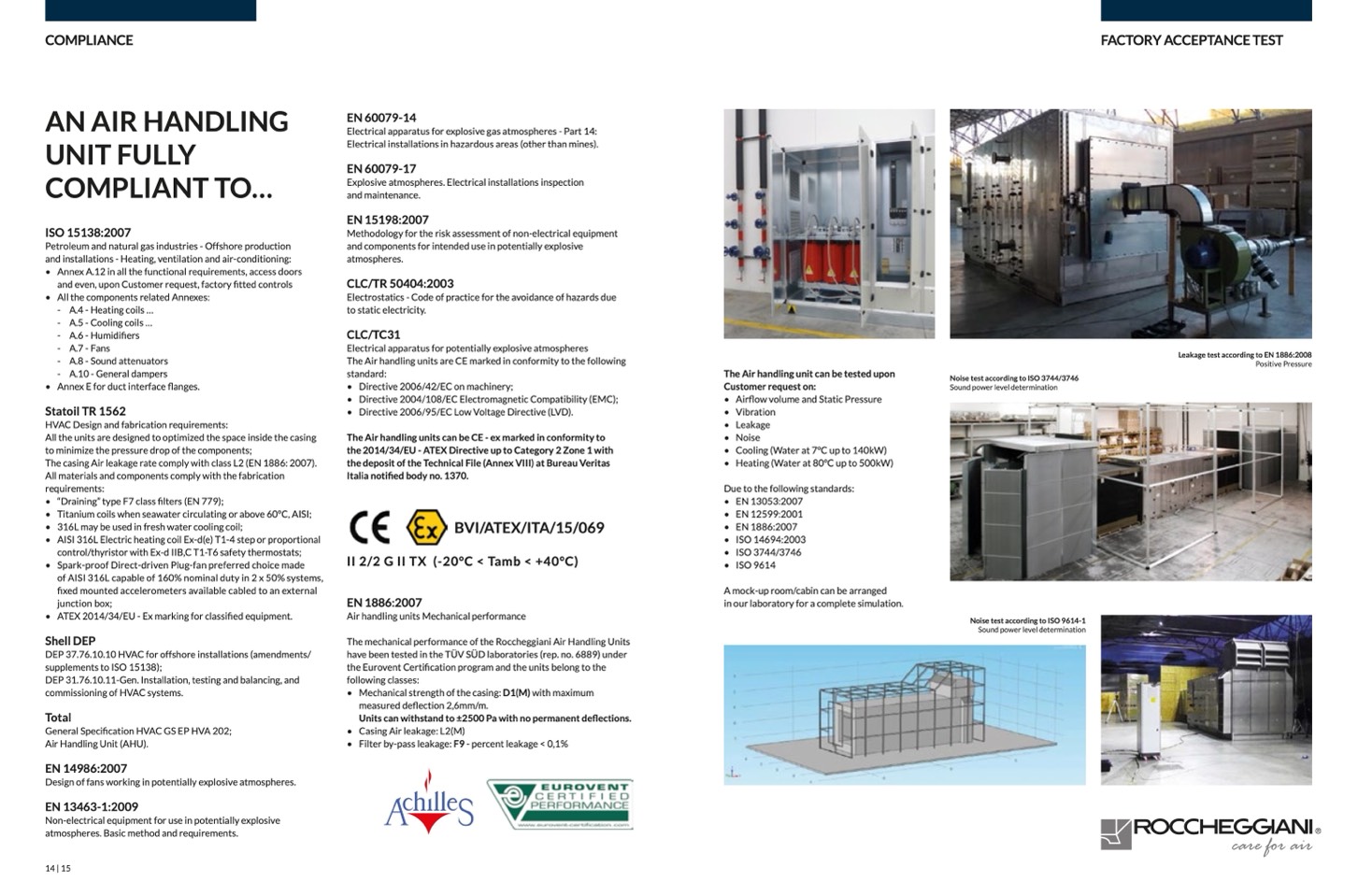
COMPLIANCE
FACTORY ACCEPTANCE TEST
AN AIR HANDLING
UNIT FULLY
COMPLIANT TO...
ISO 15138:2007
Petroleum and natural gas industries - Offshore production
and installations - Heating, ventilation and air-conditioning:
• Annex A.12 in all the functional requirements, access doors
and even, upon Customer request, factory fitted controls
• All the components related Annexes:
- A.4 - Heating coils ...
- A.5 - Cooling coils ...
- A.6 - Humidifiers
- A.7 - Fans
- A.8 - Sound attenuators
- A.10 - General dampers
• Annex E for duct interface flanges.
Statoil TR 1562
HVAC Design and fabrication requirements:
All the units are designed to optimized the space inside the casing
to minimize the pressure drop of the components;
The casing Air leakage rate comply with class L2 (EN 1886: 2007).
All materials and components comply with the fabrication
requirements:
• “Draining” type F7 class filters (EN 779);
• Titanium coils when seawater circulating or above 60°C, AISI;
• 316L may be used in fresh water cooling coil;
• AISI 316L Electric heating coil Ex-d(e) T1-4 step or proportional
control/thyristor with Ex-d IIB,C T1-T6 safety thermostats;
• Spark-proof Direct-driven Plug-fan preferred choice made
of AISI 316L capable of 160% nominal duty in 2 x 50% systems,
fixed mounted accelerometers available cabled to an external
junction box;
• ATEX 2014/34/EU - Ex marking for classified equipment.
Shell DEP
DEP 37.76.10.10 HVAC for offshore installations (amendments/
supplements to ISO 15138);
DEP 31.76.10.11-Gen. Installation, testing and balancing, and
commissioning of HVAC systems.
Total
General Specification HVAC GS EP HVA 202;
Air Handling Unit (AHU).
EN 14986:2007
Design of fans working in potentially explosive atmospheres.
EN 13463-1:2009
Non-electrical equipment for use in potentially explosive
atmospheres. Basic method and requirements.
EN 60079-14
Electrical apparatus for explosive gas atmospheres - Part 14:
Electrical installations in hazardous areas (other than mines).
EN 60079-17
Explosive atmospheres. Electrical installations inspection
and maintenance.
EN 15198:2007
Methodology for the risk assessment of non-electrical equipment
and components for intended use in potentially explosive
atmospheres.
CLC/TR 50404:2003
Electrostatics - Code of practice for the avoidance of hazards due
to static electricity.
CLC/TC31
Electrical apparatus for potentially explosive atmospheres
The Air handling units are CE marked in conformity to the following
standard:
• Directive 2006/42/EC on machinery;
• Directive 2004/108/EC Electromagnetic Compatibility (EMC);
• Directive 2006/95/EC Low Voltage Directive (LVD).
The Air handling units can be CE - ex marked in conformity to
the 2014/34/EU - ATEX Directive up to Category 2 Zone 1 with
the deposit of the Technical File (Annex VIII) at Bureau Veritas
Italia notified body no. 1370.
BVI/ATEX/ITA/15/069
II 2/2 G II TX (-20°C < Tamb < +40°C)
EN 1886:2007
Air handling units Mechanical performance
The mechanical performance of the Roccheggiani Air Handling Units
have been tested in the TÜV SÜD laboratories (rep. no. 6889) under
the Eurovent Certification program and the units belong to the
following classes:
• Mechanical strength of the casing: D1(M) with maximum
measured deflection 2,6mm/m.
Units can withstand to ±2500 Pa with no permanent deflections.
• Casing Air leakage: L2(M)
• Filter by-pass leakage: F9 - percent leakage < 0,1%
Leakage test according to EN 1886:2008
Positive Pressure
The Air handling unit can be tested upon
Customer request on:
• Airflow volume and Static Pressure
• Vibration
• Leakage
• Noise
• Cooling (Water at 7°C up to 140kW)
• Heating (Water at 80°C up to 500kW)
Due to the following standards:
• EN 13053:2007
• EN 12599:2001
• EN 1886:2007
• ISO 14694:2003
• ISO 3744/3746
• ISO 9614
A mock-up room/cabin can be arranged
in our laboratory for a complete simulation.
Noise test according to ISO 3744/3746
Sound power level determination
Noise test according to ISO 9614-1
Sound power level determination
14 | 15

